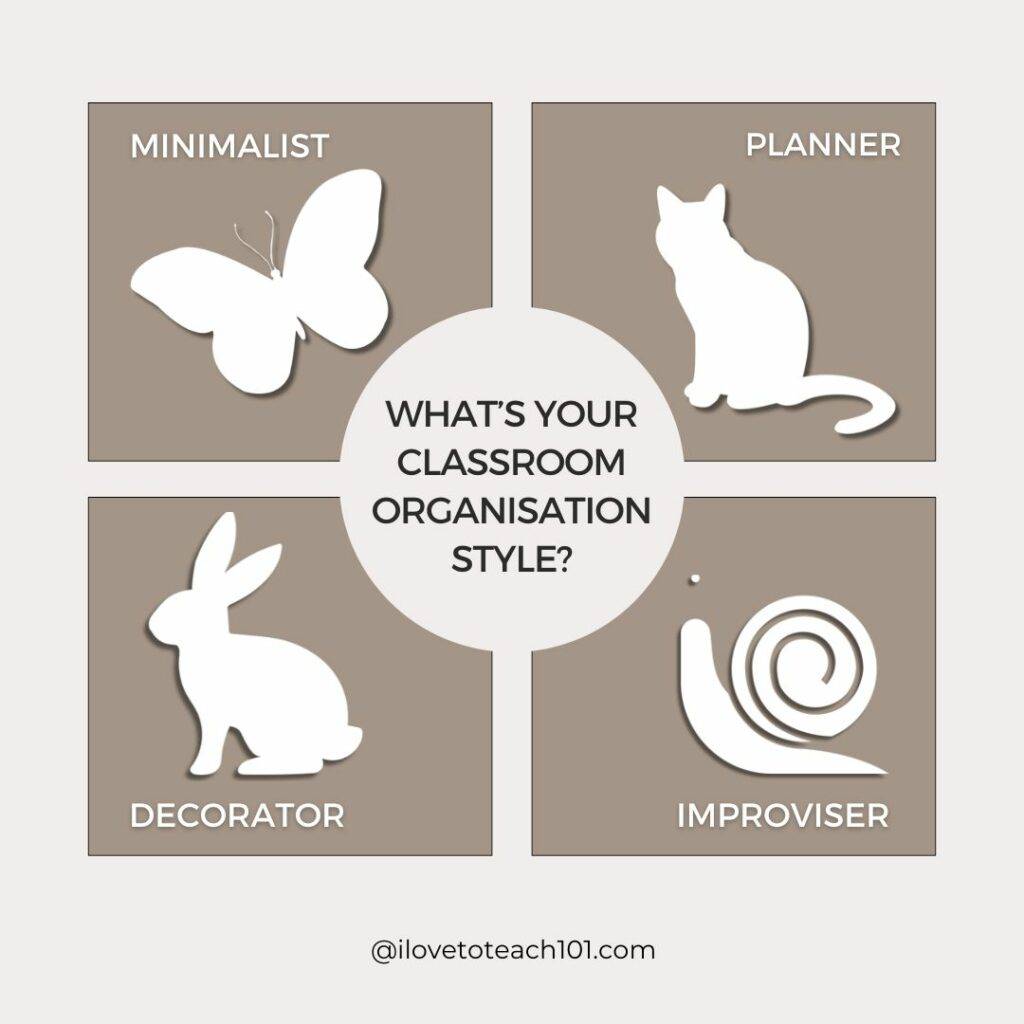4 Simple Keys to Winning Classroom Organisation

What comes to mind when you think about classroom organisation? Neatly placed books on pristine shelves? Gleaming tables and spotless carpets? While these images are familiar, they only scratch the surface. True classroom organisation is much more than aesthetics, it’s the foundation for a thriving teaching environment.
Let’s explore four key aspects of classroom organisation that can transform your space and your teaching experience.
1. Align organisation with your teaching style
Your classroom should reflect your unique teaching style. In my book, ‘A Teacher Style Guide to Classroom Organization’, I discuss four teaching styles of classroom organisation. Whether you’re a Planner Cat, Improviser Snail, Minimalist Butterfly, or Decorator Rabbit, your approach to organisation should support, not hinder, your natural tendencies.
Note: The title of the book uses American spelling (‘Organization’) as it is published in the United States.
Understanding your teaching style allows you to create systems that feel intuitive. For instance, if you’re a Planner Cat you might thrive with detailed schedules and categorised storage. Meanwhile, a Minimalist Butterfly may prefer a simple, clutter-free space that prioritises essential materials.
Discover your teaching style with our quick quiz and get a custom report designed to help you boost student creativity by clearing the clutter. Along with 3 student games to keep your classroom organised. By aligning your classroom organisation with your teaching style, you’ll create a space where both you and your students feel comfortable and focused.

2. Recognise the impact on classroom management
Classroom organisation is more than tidiness, it’s the bedrock of effective classroom management. A cluttered space can lead to a cluttered mind, both for you and your students.
Your students feed off the energy of their environment. A well-organised classroom fosters a sense of calm, structure, and purpose, which helps students stay engaged and on task. On the other hand, disorganisation can foster chaos and disengagement.
When you prioritise classroom organisation, you’re also cultivating productive habits in your students, leading to a more harmonious and efficient learning environment.
3. Start simple and build from the ground up
If the thought of organising your classroom feels overwhelming, start small. The key is to focus on building a strong foundation. Tidy drawers, eliminate unnecessary clutter, and create zones for specific activities.
As the saying goes: “A tidy space leads to a tidy mind.” When your space is organised, you’ll spend less time searching for misplaced materials and more time focusing on teaching. The small, simple steps you take today can have a big impact on your overall productivity and well-being.
Remember, classroom organisation is a journey, not a one-time event. Consistency is key, and every small improvement you make will pay off in the long run.
4. Use the right tools and resources
Winning at classroom organisation involves more than just personal effort; it’s about leveraging the right tools to make your work easier and more effective. Here are three platforms that can significantly improve how you manage your classroom:
ClassDojo: Enhances classroom management by allowing teachers to reinforce positive behaviours through a point-based reward system. You can award or deduct points, communicate with parents, and engage students in real time, fostering a positive learning environment.
SeeSaw: Ideal for younger students, SeeSaw serves as a digital portfolio platform that enhances creative expression and facilitates seamless communication between teachers, students, and families. It encourages students to create and share their digital work, which helps in maintaining an organised and engaging educational environment.
Google Classroom: Simplifies the creation, distribution, and grading of assignments, promoting a paperless classroom. It acts as a central hub for teacher-student communication, making educational interactions more structured and organised.
These tools not only aid in maintaining an organised classroom but also enhance the educational experience by supporting varied learning and teaching styles.

Take charge of your classroom organisation today
Classroom organisation is about more than just creating a tidy space. It’s about crafting an environment that enhances learning, reduces stress, and empowers you to thrive as an educator.
Dr Melissa Caudle, former principal and now an author, recommends A Teacher Style Guide to Classroom Organization by Sylvia Skinner, calling it “an example of an effective handbook that any educator can refer to, regardless of experience.”
Note: The title of the book uses American spelling (‘Organization’) as it is published in the United States.
The book offers practical strategies and insights to help teachers of all styles. You’ll learn actionable steps to maintain an organised space and understand how organisation affects your teaching practice.
By purchasing ‘A Teacher Style Guide to Classroom Organization‘ through my Amazon account, you’ll not only gain the tools to improve your teaching practice but also support a meaningful cause. A portion of the proceeds directly helps teachers in need in the Solomon Islands.
Focus on these four keys: align your organisation with your teaching style, understand its impact on classroom management, start small and simple, and use the right tools. Together, they’ll transform your teaching space into an efficient, inspiring environment that works for both you and your students.
Don’t wait to make a change. Whether you start by clearing a single drawer or explore ‘A Teacher Style Guide to Classroom Organization‘, every small step brings you closer to a classroom that works for you.
Choose your format and purchase securely.

